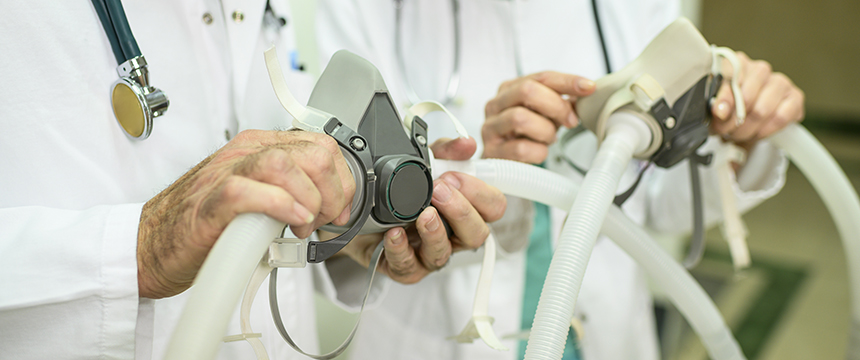COVID-19: FDA Issues Guidance for Ventilator and Respirator Manufacturers

Patients with COVID-19 may develop respiratory illness, distress, and insufficiency and may require respiratory devices including ventilators, anesthesia gas masks, and other devices to support their treatment. However, with the number of confirmed cases in the U.S. increasing daily, there is growing concern that the supply of respiratory devices to treat patients with COVID-19 is insufficient to meet demand.
On March 22, 2020, the FDA issued guidance entitled “Enforcement Policy for Ventilators and Accessories and Other Respiratory Devices During the Coronavirus Disease 2019 (COVID-19) Public Health Emergency” and shortly thereafter released an Emergency Use Authorization (EUA) on March 24, 2020. The FDA hopes to ensure sufficient availability of devices for patients that need ventilatory support. In this guidance, the FDA indicates that health care facilities should use FDA-cleared ventilators (or devices subject to an Emergency Use Authorization) when necessary to support patients. However, for the duration of the declared public health emergency, the FDA does not intend to object to the following modifications without prior submission of a 510(k) premarket notification, provided that the modification will not create an undue risk, in light of the public health emergency:
- Modification of indications, claims, or functionality of FDA cleared devices used to support patients with respiratory failure or insufficiency;
- Modification to hardware, software, or materials of FDA cleared devices used to support patients with respiratory failure or insufficiency; and
- Use of ventilators and breathing circuit devices beyond the indicated shelf life.
This policy aims to create more flexibility for manufacturers to make device modifications to address current manufacturing limitations or supply shortages, including changes to a ventilator motor to allow an alternate supplier to meet required design specifications, or changes to the material in the ventilator tubing to allow for material sourcing alternatives. Notably, the FDA does not define what constitutes an “undue risk,” but provides several examples of modifications and use that would not create an undue risk in each category.
1. Modifications to indications, claims, or functionality: The FDA provides the following examples of modifications to indications, claims or functionality that would not create an undue risk:
- The use of powered emergency ventilators and anesthesia gas machines for patients needing mechanical ventilation;
- The use of ventilators outside their cleared environment (e.g., use of ventilator in a health care facility when the FDA has only cleared the ventilator for home use);
- Use of devices intended for sleep apnea to treat patients with respiratory insufficiency when appropriate design mitigations are in place to minimize aerosolization; and
- Use of oxygen concentrators for primary supply when medically necessary and clinically appropriate.
2. Hardware, software, or material changes: The FDA provided the following examples of modifications to device hardware, software, and material that would not create undue risk:
- Modifications to motors, batteries, and other electrical components;
- Material changes to components in the gas pathway or with other patient tissue contact;
- Introduction of filtration to minimize aerosolization;
- Software modifications intended to modify ventilation parameters;
- Software modifications implementing physiological closed loop algorithms for oxygen titration;
- Hardware and/or software modifications implementing the capability for remote monitoring and remote adjustment of ventilator parameters; and
- Modifying or adding to hardware/software architecture to allow for increased remote monitoring (e.g. addition of bluetooth).
Note, however, that the FDA guidance requires manufacturers to document changes to their device in their master record and change control records and manufacturers must make records available to the FDA upon request.
3. Use of ventilator beyond the indicated shelf life: The FDA guidance indicates the FDA does not object to changes in the indicated shelf life and duration of use of ventilator and anesthesia gas machine breathing circuit devices without a prior 510(k) notification where the change does not create an undue risk.
Additionally, the FDA guidance includes labeling guidelines for modified devices. Modified devices should be labeled to include:
- A clear description of the new indications, claims, functions, and information on the device’s performance and potential risks;
- Adequate instructions for use for the intended use and indicated environments for use, including highlighting the differences in design compared to the FDA cleared version of the device; and
- A clear differentiation between the FDA cleared indications and those indications that the FDA has not cleared, including a general statement about changes that the FDA has not cleared.
Finally, in the EUA, the FDA authorizes the emergency use of ventilators, gas masks, and anesthesia gas machines modified for use as ventilators for treating patients during the COVID-19 pandemic. The FDA waives current good manufacturing practice requirements and certain registration and listing requirements during the duration of the EUA. The FDA indicates that it will work with manufacturers to support the wider availability of devices for patients who need ventilator support and interested sponsors can contact the FDA at [email protected].
The FDA is implementing this guidance immediately, but remains subject to comment. For more information, please contact your Foley relationship partner or the Foley colleagues listed below. For additional web-based resources available to assist you in monitoring the spread of the coronavirus on a global basis, you may wish to visit the websites of the CDC and the World Health Organization.
Foley has created a multi-disciplinary and multi-jurisdictional team to respond to COVID 19, which has prepared a wealth of topical client resources and is prepared to help our clients meet the legal and business challenges that the coronavirus outbreak is creating for stakeholders across a range of industries. Click here for Foley’s Coronavirus Resource Center to stay apprised of relevant developments, insights and resources to support your business during this challenging time. To receive this content directly in your inbox, click here and submit the form.


